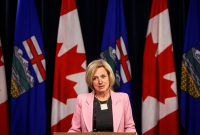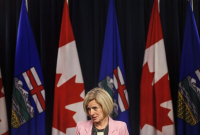Support strong Canadian climate journalism for 2025
The British Columbia government filed a constitutional lawsuit Tuesday countering an Alberta government bill that would limit fuel being sent to the province.
It comes weeks after the B.C. government asked its highest court to decide if it has the right to limit the flow of bitumen in the Trans Mountain pipeline.
Alberta Premier Rachel Notley saw some irony in B.C.'s position.
"It's very interesting, on one hand they don't want our oil and on the other hand they're suing us to give them our oil," she told a news conference in Edmonton on Tuesday.
The latest legal action further strains an acrimonious relationship between the two provinces over the expansion of the Trans Mountain pipeline.
Attorney General David Eby said B.C. is prepared to ask for an injunction and financial damages against Alberta if it restricts the flow of fuel.
Notley said the lawsuit is just one of several tactics to create uncertainty over the Kinder Morgan pipeline project.
"They must think everybody was born yesterday," Notley said. "They are still reserving the right to play legal rope-a-dope until the cows come home. That is not a thing we are going to let happen."
Plans to triple the capacity of Kinder Morgan's existing Trans Mountain pipeline from Edmonton to Burnaby have pitted Alberta and the federal government against B.C., which says the risk of a bitumen spill is too great for the province's environment and economy.
Eby said the Alberta and the federal government are causing delays by refusing to accept B.C.'s invitations to join legal cases, or take legal arguments straight to the Supreme Court of Canada where the outcomes are final.
The B.C. government has filed a reference case in the provincial Court of Appeal to determine if it has jurisdiction to regulate heavy oil shipments. It also joined two other lawsuits launched by Indigenous groups opposed to the $7.4-billion pipeline project.
Eby said the lawsuit filed Tuesday in Alberta's Court of Queen's Bench challenges the constitutionality of Alberta's law because it is intended to punish B.C.
"We believe it would be reckless in the extreme and therefore highly unlikely that Alberta will actually attempt to use the powers they granted themselves in Bill 12," he told a conference call. "If Alberta did take the remarkable step of attempting to use this law, we are prepared to immediately file and injunction. We will not hesitate."
Notley bowed out of a Western premier's meeting on Wednesday in Yellowknife, saying she could not discuss issues like a national prescription drug plan in the presence of B.C. Premier John Horgan while his government is trying to stop the pipeline project.
"Pharmacare does not grow on trees," Notley said. "In order to protect and improve the things that matter to people, like pharmacare, we need a strong, functioning national economy."
Before he left for the meeting, Horgan said he didn't expect tensions over the pipeline to dominate discussions among the premiers.
Kinder Morgan has ceased all non-essential spending on the project until it receives assurances it can proceed without delays, setting a May 31 deadline for those guarantees.
Notley said Alberta and the federal government are both working on plans to ensure the project proceeds. Federal Finance Minister Bill Morneau has offered an indemnity to backstop the pipeline project.
B.C.'s nine-page statement of claim alleges the intent of Alberta's bill is to hurt to the province.
"A significant disruption in the supply of gasoline, diesel, and crude oil from Alberta to British Columbia would cause British Columbia irreparable harm," the document asserts. "In addition to economic harm, a sudden disruption in supply could injure human health and safety in remote communities."





Comments